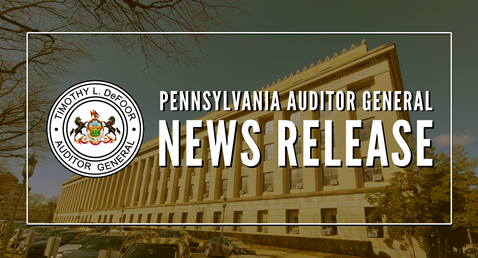Auditor General DePasquale Says Municipal Pension Task Force Recommendations Offer Realistic, Responsible Reforms
Says improvements will require discipline at both state, local levels
Auditor General DePasquale Says Municipal Pension Task Force Recommendations Offer Realistic, Responsible Reforms
Says improvements will require discipline at both state, local levels
Link to Auditor General's report showing $7.7 billion unfunded municipal pension liabability
HARRISBURG (June 30, 2015) – Auditor General Eugene DePasquale today said the report of the Task Force on Municipal Pensions offers realistic and responsible reforms to address problems with Pennsylvania’s system of local government retirement plans. The report was delivered to Gov. Tom Wolf earlier today.
In May, DePasquale was named by Gov. Wolf as chair of the task force, which was charged with developing workable, fair and responsible recommendations to address the pension challenges of local governments. Other members of the task force are: Mary Soderberg, former secretary of the budget, Camp Hill; Janet Yeomans, former vice president and treasurer of 3M Corp., Philadelphia; and Susan Hockenberry, executive director, Local Government Academy, Pittsburgh.
“There clearly is a consensus — among those on all sides of the pension issue – that we must act quickly to address the challenges with our municipal pension system,” DePasquale said. “To delay action any longer could threaten the economic stability of our communities and our state as a whole. Our recommendations will require discipline at both the state and local levels, but continued inaction is simply not an option.”
According to the latest actuarial data from the Public Employee Retirement Commission as of January 2013, the unfunded liability of Pennsylvania municipal pension plans has doubled in the last 10 years. It is now $7.7 billion. Approximately 3,240 local government plans exist in the commonwealth; 2,600 of these are municipal plans. About one-third of Pennsylvania municipal pension plans are less than 80 percent funded.
Pennsylvania’s municipal pension challenges have resulted from a combination of many factors, including a lack of consistent and sound investment return assumptions, a failure to fully fund obligations, increased life expectancies of retirees and current employees, cases where there are fewer active employees than retirees, and the stock market decline in 2008.
“Despite the causes of the current problem, if unresolved, the municipal pension issue could cripple state and local taxpayers, reduce or totally cut local government services, and jeopardize the future for our communities, and the retirement incomes of thousands of municipal employees,” DePasquale said. “It is my hope that the governor and the General Assembly will review the task force recommendations and work together to implement them.”
To accomplish needed reforms, the task force recommends the following:
Increasing transparency and accountability for all municipal pension plans by:
- increasing penalties for municipalities that do not pay their full minimum municipal obligation (MMO);
- ending the current practice of allowing state municipal pension aid to be used for administrative expenditures;
- adopting standards to require municipalities to disclose pension liability and requiring the public posting of municipal pension costs; and
- excluding municipal pensions from collective bargaining.
Helping with the recovery of underfunded pension plans by:
- requiring underfunded pension plans to adopt new investment and benefit standards including controlling management fees, capping overtime and excluding accumulated leave from pension calculations, eliminating lump-sum Deferred Retirement Option Program (DROP) payments, adopting realistic rates of return on investments and limiting benefit enhancement;
- shifting management responsibility for underfunded plans to a shared investment manager; and
- possibly creating a new statewide defined benefit structure for all new hires in underfunded plans.
The task force also recommends that the Pittsburgh and Philadelphia pension plans be given the option of joining the other underfunded municipalities in the plan outlined above, or maintaining their own investment managers/plan administrators, with specific requirements and consequences for achieving reforms. Philadelphia and Pittsburgh represent a huge portion – over $6 billion of the state’s unfunded municipal pension liability.
It is also suggested that the Department of the Auditor General and the Public Employee Retirement System work together to modernize state aid distribution and reporting systems to enable annual reporting in line with common industry practice.
“We thank individuals representing government retirement entities, unions, elected officials, trade associations, research organizations, and the financial industry for sharing their expertise in pension issues, “DePasquale said. “All contributed to the final report. We realize more conversations with these groups need to continue.
The auditor general’s municipal pension report released in January found that nearly half of the employee plans statewide are in distress. The report predicts that without help, the City of Scranton – the state’s sixth largest city – could go bankrupt in two years.
Other cities where Auditor General DePasquale recently sounded the municipal pension alarm include: Pittsburgh, York and Jeannette.
A copy of the report, “Pennsylvania’s Municipal Pension Challenges – Recommendations from Governor Tom Wolf’s Municipal Pension Task Force,” is available here.
# # #
